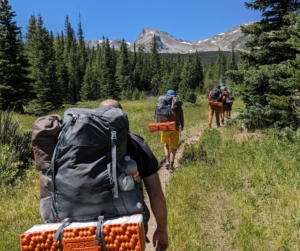Teamwork on the Trail
 Recovery is a term frequently used by people with mental health issues to describe their efforts to live meaningful and satisfying lives. Colorado Recovery approaches mental healthcare based on a path of self-reliance through developed practiced skills. This non-institutionalized social recovery offers comprehensive levels of care supported by an expert medical and clinical team, engaging patients in increasing community participation.
Recovery is a term frequently used by people with mental health issues to describe their efforts to live meaningful and satisfying lives. Colorado Recovery approaches mental healthcare based on a path of self-reliance through developed practiced skills. This non-institutionalized social recovery offers comprehensive levels of care supported by an expert medical and clinical team, engaging patients in increasing community participation.
One important element of this approach is the great outdoors surrounding the Colorado Recovery campus in Boulder. “It’s important to get people out of their comfort zone,” says interim executive director Terry Stiven.
In August, Stiven and vocational rehabilitation specialist Peter Kamback accompanied some Colorado Recovery clients on a fairly challenging three-day excursion up and around the Buchanan Pass area in Colorado.
Good preparation was key, as clients were asked to hike for miles with a fifty-pound pack on their backs and set up a campsite. “We talked about teamwork,” remembers Stiven. “Who’s going to make meals? What kind of meal are they going to make? Who is responsible for clean-up?”
“The thorough preparation paid off,” says Kamback. “They met this challenge really well—we didn’t get a single complaint from anyone. They were real troopers out there.”
“We took our time on day one,” he remembers. “We hiked out there and set up a campsite—a great team-building exercise. Everybody helped out and later in the evening contributed to the meal. It was a real group effort.”
As a matter of principle, meals were pretty basic on this trip: oatmeal and breakfast bars in the morning, sandwiches for lunch, rice and pasta dishes in the evening—nothing fancy.
“Everyone was excited to get moving again the next day,” recalls Kamback. “We hiked to a lake under blue skies. Terry brought fishing gear and some of us jumped into the lake’s cold water. Everyone had a lot of fun.”
The weather changed on the way back to camp. First, there was a light drizzle, followed by a storm in the evening—again a valuable experience for our clients. “They had to deal with the unexpected,” says Kamback. “Fortunately, we were able to have dinner before the storm hit. We then sat out the storm in our tents and there was light rain throughout the night but it didn’t affect their mood. The whole group handled it together but they had to push their boundaries and comfort limits a little bit.”
An attitude of team spirit prevailed as everybody felt they were all together in this adversity. The next day was bright and sunny and the team packed up and started the hike back. “The backpacks felt lighter this time because it was mostly downhill now,” says Kamback who was impressed by one patient in particular. “One client took on a leadership role on the way back. He turned out to be a fast hiker and he did an incredible job making sure we all stayed together.”
“There were smiles on the trail, they showed good communication and worked as a team, Kamback says. “They took every opportunity to enjoy the landscape and overall it was a big confidence booster for our clients. It was just a great experience for everyone and they all voiced interest in doing it again. This was clearly the highlight of their year so far.”
At Colorado Recovery, our mission is to help adults with serious mental health issues stabilize their illness, minimize symptoms, improve functioning, and enhance each person’s social inclusion, quality of life, and sense of meaning in life.
If you have questions about our recovery model or our services to treat schizophrenia, bipolar disorder, and similar mental illnesses, call us at 720-218-4068 to discuss treatment options for you or the person you would like to help.

 Colorado Recovery provides psychiatric care to adults diagnosed with schizophrenia, bipolar disorder, schizoaffective disorder, depression with or without psychotic features, dual diagnosis of mental illness with substance misuse, and other psychotic disorders.
Colorado Recovery provides psychiatric care to adults diagnosed with schizophrenia, bipolar disorder, schizoaffective disorder, depression with or without psychotic features, dual diagnosis of mental illness with substance misuse, and other psychotic disorders.
